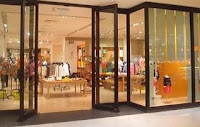Many of us have been turning to Madewell lately as they are doing a
really nice job of offering styles that are truly "classics with a
twist".
"
Thanks!" to
J.Crew Guy In Canada who shared the following article about Madewell's origin story from Buzz Feed (click
here to read in its entirety) with us:
Something Borrowed, Something Blue
By Dan Nosowitz
September 28, 2014
In 1937, my great-grandfather started a workwear company in New England called Madewell. In 2006, 17 years after the last factory shut down, J.Crew relaunched a women’s clothing company with the same name and logo, based on a 50-year history in which it had no part.
I stopped dead on Broadway, in the middle of the sidewalk, and stared, not up at the beautiful wrought-iron SoHo buildings, as would befit someone who’d moved to New York in the past month, but at an ordinary sign advertising a small clothing shop. The logo, a casual cursive scrawl with both E’s capitalized, jumped out at me like a beacon from a lighthouse somewhere deep in the back of my brain. That was the logo emblazoned on my baby clothes, the logo my great-grandfather created. It was, I thought, forgotten family history, the factories having shut down shortly after I was born in the ’80s. ...
Over the next four years, I saw Madewell everywhere. Today there are three stores in Manhattan alone, and 77 throughout the country. On bags on the subway, on tags of clothes worn by friends, I am constantly bombarded with totems of my family history.
Asking my family yielded the basics: Madewell as it stands today began in 2004. That’s when Millard “Mickey” Drexler, now the CEO of J.Crew, acquired the logo and the trademark of the company my great-grandfather founded in 1937. Dhani Mau, a senior editor at Fashionista, said, “J.Crew considers it their younger sister brand,” though she said it’s not necessarily for younger sisters. Pressed to pick out a celebrity who might typify the Madewell girl, Mau chose Kate Bosworth and Rachel Bilson. This does not entirely jibe with my mental picture of my tough immigrant great-grandfather selling stiff denim overalls to New England dockworkers.
Still, Madewell will not let you forget the date 1937. The store could originally be found online at madewell1937.com, and the year is prominent on the site and on some of the clothing. The company’s Instagram and Twitter handles are both still @Madewell1937, and its LinkedIn page says, “Madewell was started in 1937 as a workwear company, and we’re always looking to the brand’s roots for inspiration.”
This is, to put it mildly, baloney. Madewell as it stands today has almost nothing at all to do with the company founded by my great-grandfather almost 80 years ago. How many vintage labels out there have similar stories? How many corporations are out there rifling through the defunct brands of America’s past like a bin of used records, looking for something, anything, that will give them that soft Edison-bulb glow of authenticity?
Madewell’s story — my story — leading up to that moment in SoHo began over a century ago, half a world away. It traces the evolution of how Americans shop, and how Americans shop heavily informs how Americans see themselves; we, as a country, are what we buy. Mickey Drexler, in creating J.Crew’s new womenswear stores, shrewdly read the market and realized that stocking nice clothes wouldn’t be enough: He’d have to tell a story along with them. Drexler didn’t have any stories, so he bought ours. ...{much more to read here}
Really interesting to read this family member's take on Madewell's transition from family brand, forgotten logo, to trendy retailer. I can see the passion coming through his words about his family's history, of which he should be proud of.
This post reminded me a lot of a piece on CBS'
60 Minutes about Luxottica, a famous producer of sunglasses. (Watch and read about the
60 Minutes segment
here.) It discussed the American brand Ray-Ban and how it was struggling. The Italian company, Luxottica, ended up purchasing the brand and turned it around. Today, Ray-Ban sunglasses are world-renowned top-sellers while playing on its iconic American history, despite being produced and owned elsewhere.
But back to Madewell... Honestly, it is no secret about Madewell's past and how Mickey Drexler
came to acquire the brand, logo, etc. Although, I do think Mickey
Drexler/ J.Crew Corporate try to emphasize Madwell's rich past as though
the Madewell brand under J.Crew has been around that long.
But isn't it better that the Madewell brand lives on and not forgotten altogether? I mean, J.Crew/Mickey Drexler did do a pretty good job of portraying Madewell as a retailer of quality denim and leather. Just a thought...
What are your thoughts on the post? Any points of the article resonate with you? If so, please
share!


















































